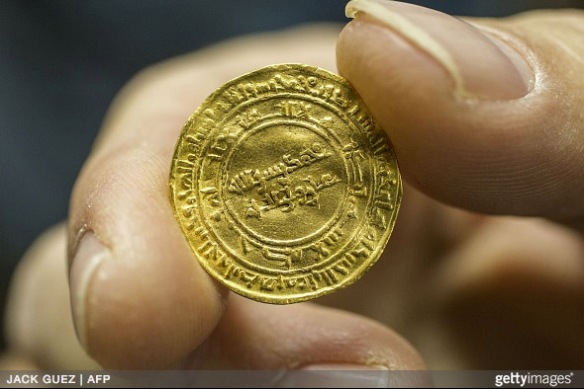February 19th, 2015
Five recreational divers discovered 2,000 ancient gold coins off the coast of Israel — a find that's being touted as the largest single cache of currency ever recovered in that country. The treasure weighed a total of 13.2 pounds and was in pristine condition despite being submerged for 1,000 years.

The amazing discovery took place at Caesarea, a coastal city about 30 miles north of Tel Aviv that was built by Herod the Great in the year 25 B.C.
The divers originally believed they had come across coins from a children’s game, but, upon closer inspection, realized they had stumbled upon something special. According to the Israeli newspaper Haaretz, the divers reported their find to the head of the Caesarea Diving Club, who, in turn, alerted the Israel Antiquities Authority. Using metal detectors, the Authority's divers were able to secure 2,000 coins with a precious metal value of $258,000. Due to their rarity and historical significance, their value is likely many times that amount.

The treasure included coins in two denominations, dinars and quarter dinars. The coin insignias revealed they were from the Fatimid Period, when the Fatimid Kingdom ruled North Africa and Palestine. The earliest coin was minted in Sicily in the second half of the 9th century and the latest coin was minted in 1036.
A spokesman from the Israel Antiquities Authority surmised that the coins were probably from a treasury boat that sank just after 1036.

“The ship may have been carrying tax money on its way to the central government in Egypt, or perhaps the coins were meant to pay the salaries of soldiers in the Fatimid garrison stationed in Caesarea,” Jacob Sharvit, head of the authority’s marine unit, told Haaretz.
Robert Kool, an Antiquities Authority coin expert, said that the preservation of the dinars was excellent and that they needed no cleaning in the lab. “That is because gold is a noble metal, which is not impacted by water or air,” he noted.
Kool told Haaretz that some of the coins bore bite marks, which was a common way for ancient merchants to test the quality of the metal.
Marine archaeologists, under the direction of the Israel Antiquities Authority, are planning to investigate the treasure site to find out more about the wreck.
The amateur divers were praised as “model citizens” for their honesty in turning over the ancient coins to Israeli authorities rather than trying to keep the coins for themselves.
Photos: Getty Images

The amazing discovery took place at Caesarea, a coastal city about 30 miles north of Tel Aviv that was built by Herod the Great in the year 25 B.C.
The divers originally believed they had come across coins from a children’s game, but, upon closer inspection, realized they had stumbled upon something special. According to the Israeli newspaper Haaretz, the divers reported their find to the head of the Caesarea Diving Club, who, in turn, alerted the Israel Antiquities Authority. Using metal detectors, the Authority's divers were able to secure 2,000 coins with a precious metal value of $258,000. Due to their rarity and historical significance, their value is likely many times that amount.

The treasure included coins in two denominations, dinars and quarter dinars. The coin insignias revealed they were from the Fatimid Period, when the Fatimid Kingdom ruled North Africa and Palestine. The earliest coin was minted in Sicily in the second half of the 9th century and the latest coin was minted in 1036.
A spokesman from the Israel Antiquities Authority surmised that the coins were probably from a treasury boat that sank just after 1036.

“The ship may have been carrying tax money on its way to the central government in Egypt, or perhaps the coins were meant to pay the salaries of soldiers in the Fatimid garrison stationed in Caesarea,” Jacob Sharvit, head of the authority’s marine unit, told Haaretz.
Robert Kool, an Antiquities Authority coin expert, said that the preservation of the dinars was excellent and that they needed no cleaning in the lab. “That is because gold is a noble metal, which is not impacted by water or air,” he noted.
Kool told Haaretz that some of the coins bore bite marks, which was a common way for ancient merchants to test the quality of the metal.
Marine archaeologists, under the direction of the Israel Antiquities Authority, are planning to investigate the treasure site to find out more about the wreck.
The amateur divers were praised as “model citizens” for their honesty in turning over the ancient coins to Israeli authorities rather than trying to keep the coins for themselves.
Photos: Getty Images



